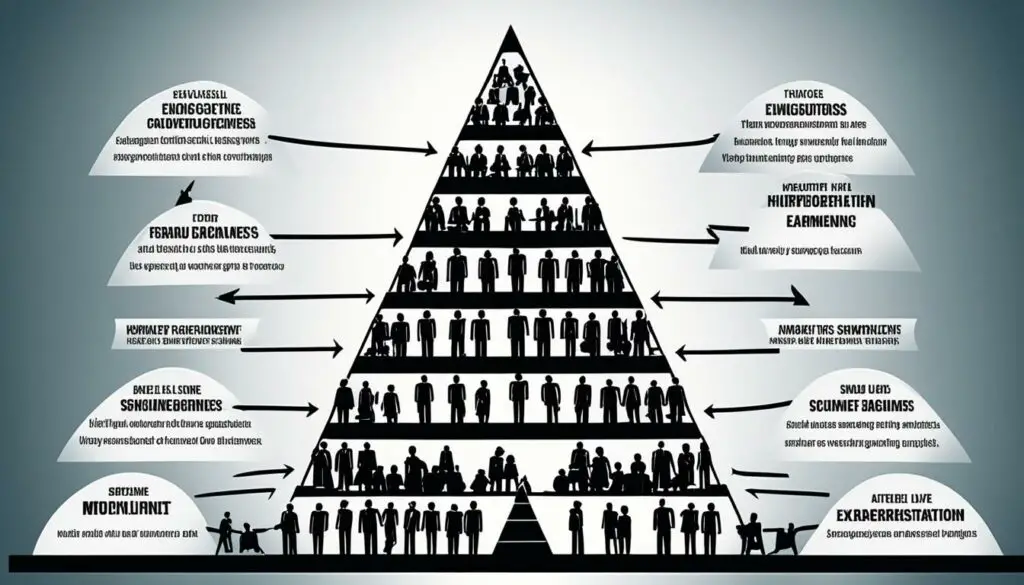Network marketing and multi-level marketing (MLM) are both strategies used by direct sales companies to sell products and services. While they share similarities, there are key distinctions that set them apart. Understanding the differences between network marketing and MLM can help individuals make informed decisions about their entrepreneurial endeavors and potential income opportunities.
In network marketing, individuals are encouraged to promote and sell offerings to others. They earn commissions based on their sales performance. However, in MLM, distributors are not only incentivized to sell products but also to recruit new members into the business. MLM compensation plans often involve earning a percentage of recruits’ sales, creating the potential for additional income streams.
It is important to note that while many MLM schemes are legal and operate within ethical boundaries, there are also illegal pyramid schemes that operate under the guise of MLM. These illegal schemes prioritize recruitment over actual product sales and often leave participants at a significant financial disadvantage.
Key Takeaways:
- Network marketing and MLM are sales strategies used by direct sales companies.
- In network marketing, individuals focus on selling products to others, while in MLM, distributors also recruit new members.
- MLM compensation plans often involve earning a percentage of recruits’ sales.
- Illegal pyramid schemes often operate under the guise of MLM, emphasizing recruitment over product sales.
- It is important to carefully evaluate MLM opportunities to ensure they are legitimate and align with personal goals and values.
What Is Multilevel Marketing (MLM)?
Multilevel marketing (MLM) is a legitimate business strategy used by some direct sales companies. It involves existing members promoting and selling products to individuals and recruiting new members into the business. Distributors are paid a percentage of their recruits’ sales, creating a multilevel commission structure. This unique business model allows participants to earn money not only from their own sales efforts but also from the sales generated by their recruits.
However, it is important to be aware that not all MLM companies operate ethically. Some illegal pyramid schemes masquerade as MLMs, using money from new recruits to pay people at the top instead of compensating those who perform the work. These pyramid schemes often collapse when there are not enough new recruits, leaving many participants at a financial loss.
To ensure that MLM programs do not operate as pyramid schemes, the Federal Trade Commission (FTC) closely investigates and regulates this industry. The FTC monitors MLM companies to ensure that their primary focus is on the sale of legitimate products and services, rather than solely on recruitment.
Characteristics of Multilevel Marketing (MLM)
- Existing members promote and sell products to individuals.
- Recruiting new members into the business is encouraged.
- Participants earn a commission from their own sales and the sales of their recruits.
- The FTC investigates MLM programs to prevent the operation of pyramid schemes.
By understanding the legitimate aspects of MLM and the warnings signs of illegal pyramid schemes, individuals can make informed decisions regarding their involvement in this business strategy.
Understanding Multilevel Marketing (MLM)
Multilevel marketing, also known as network marketing, is a business strategy that relies on both sales and recruitment to generate revenue. Independent distributors are brought into the MLM program to sell the company’s products or services to others. They earn a commission for each sale they make.
However, MLM goes beyond simple sales. Distributors are also encouraged to recruit others into the program, building a downline or network of distributors. This recruitment aspect allows distributors to earn a percentage of their recruits’ sales, creating additional income streams.
Building a Downline in MLM
The success of an MLM distributor often hinges on their ability to build a strong and productive downline. A downline refers to the network of distributors recruited by the original distributor. The larger the downline, the more potential for sales and commission earnings.
Recruiting new participants into the MLM program requires effective MLM recruitment strategies. Distributors must pitch the opportunity, highlight the benefits of joining, and showcase the potential for financial success. By successfully recruiting new members, existing distributors can expand their network, enhance their commission earnings, and increase their overall success in MLM.
Benefits of MLM Sales and Recruitment
MLM offers unique benefits for both sales and recruitment efforts. By selling products or services, distributors can earn immediate commission income. This incentivizes distributors to focus on sales and to actively promote and market the company’s offerings, driving revenue and generating profits.
In addition to sales, the recruitment aspect of MLM creates a powerful opportunity for passive income. As recruited distributors make sales, the original distributor earns a percentage, providing a continuous stream of earnings without direct effort. This synergistic approach to MLM allows for exponential growth and income potential.
| Benefits of MLM | Sales Focus | Recruitment Focus |
|---|---|---|
| 1. Direct commission income | ☑ | |
| 2. Passive income through downline | ☑ | |
| 3. Opportunity for exponential growth | ☑ | ☑ |
By utilizing both sales and recruitment strategies, MLM distributors can maximize their income potential and create a successful business within the MLM model.
Is MLM Right for You?
If you have an entrepreneurial spirit and strong sales skills, MLM (multi-level marketing) might be the right fit for you. MLM businesses offer individuals the opportunity to set their own goals, work independently, and potentially earn significant income through commissions. However, it’s important to understand that MLM is not a typical salaried job, but rather a commission-based model.
In MLM, success often requires more than just selling products. It involves building a network of distributors and recruiting new marketers. This means that effective networking skills are crucial for achieving success in the MLM industry. By expanding your network and helping others succeed, you can increase your earning potential and build a robust MLM business.
Key Traits for MLM Entrepreneurship
- Self-Motivation: MLM entrepreneurs must be self-starters who can set their own goals and stay motivated to achieve them.
- Sales Skills: Strong sales skills are essential for selling products and building a customer base in MLM. Persuasion, communication, and relationship-building skills are key.
- Networking Abilities: Being able to connect with others and build relationships is crucial for MLM success. Networking helps you expand your customer base, recruit new marketers, and collaborate with like-minded individuals.
MLM Sales Skills
Successful MLM entrepreneurs possess a range of sales skills that contribute to their ability to sell products and recruit new marketers. Here are some essential skills for MLM sales success:
| Sales Skill | Description |
|---|---|
| Effective Communication | Being able to clearly convey product benefits and opportunity to potential customers and recruits. |
| Persistence | Continuing to pursue leads and follow up with customers and potential recruits, even in the face of rejection. |
| Relationship Building | Cultivating strong relationships with customers and recruits to foster loyalty and repeat business. |
| Product Knowledge | Having in-depth knowledge of the products and services offered by the MLM company to effectively sell and address customer inquiries. |
MLM Networking
Networking is a critical aspect of MLM. By expanding your network, you increase your potential customer base and improve your chances of recruiting new marketers. Effective MLM networking involves:
- Attending networking events and industry conferences to meet like-minded individuals and potential customers.
- Using social media platforms to connect with a wider audience and share product information.
- Seeking mentorship and guidance from experienced MLM entrepreneurs who can offer valuable insights and support.
- Building genuine relationships with customers and recruits to foster long-term loyalty and business growth.
Considering your entrepreneurial drive, sales skills, and networking abilities will help you determine if MLM is the right fit for you. Evaluating your strengths and areas for improvement will allow you to make an informed decision about pursuing MLM as a business opportunity.
What Are Some Red Flags to Look Out for an Illegal MLM Pyramid Scheme?
In the realm of MLM, it is crucial to be aware of red flags that may indicate the presence of an illegal pyramid scheme. The Federal Trade Commission (FTC) offers valuable insights for identifying such schemes and protecting oneself from becoming a victim.
Here are some key red flags to be cautious of:
- Misleading Earning Claims: Be wary of MLM promoters who make extraordinary claims about potential earnings. If it sounds too good to be true, it probably is.
- Recruitment Focus Over Product Sales: Illegal pyramid schemes prioritize recruitment over selling actual products or services. If the emphasis is heavily on recruiting others into the MLM instead of product sales, exercise caution.
- Immediate Pressure to Join: Legitimate MLMs give individuals time to consider joining and understand the business opportunity. If someone pressures you to join immediately without providing sufficient information, it might be a red flag.
- Required Purchases for Rewards: Watch out for MLM programs that require participants to make significant purchases or accumulate excessive inventory to qualify for rewards or commissions. Legitimate MLMs focus on product sales and do not force unnecessary purchases.
Pyramid schemes typically have a large number of participants and rely heavily on recruitment, while legitimate MLMs prioritize product sales and may have a recruitment component. Remember, the primary focus should be on selling products or services to consumers rather than solely selling to other participants within the MLM.
By staying vigilant and recognizing these warning signs, you can protect yourself from falling prey to illegal MLM pyramid schemes.

| Warning Signs | Legitimate MLM | Illegal Pyramid Scheme |
|---|---|---|
| Misleading Earning Claims | ✓ | ✗ |
| Recruitment Focus Over Product Sales | ✗ | ✗ |
| Immediate Pressure to Join | ✗ | ✗ |
| Required Purchases for Rewards | ✗ | ✗ |
Real-World Examples of Multilevel Marketing
Amway and Herbalife Nutrition are two prominent examples of successful MLM companies that have made a significant impact in the industry.
Amway
Amway is the largest MLM business in the world, generating substantial revenue through its diversified range of products. The company specializes in health, beauty, and home care items, offering a wide selection of high-quality goods to customers globally. Amway’s success lies in its extensive network of independent distributors who passionately sell their products and recruit new members into the business. The company has a storied history and has become synonymous with MLM success.
Herbalife Nutrition
Herbalife Nutrition is a renowned MLM company that focuses on weight-loss and nutritional products. Despite facing legal challenges and accusations of misrepresentation in the past, Herbalife Nutrition remains a prominent player in the MLM industry. Their network of distributors passionately promotes their products and recruits others into the business, driving the company’s impressive sales figures. While the brand has encountered controversies, their success serves as a testament to the versatility of MLM.
These real-world examples of MLM companies, Amway and Herbalife Nutrition, demonstrate the potential and impact of the MLM model. They showcase the adaptability of MLM in various industries, including health, beauty, home care, and nutrition. It’s important to analyze these success stories alongside the broader MLM landscape to gain a comprehensive understanding of the industry’s dynamics.
What Is MLM, and Is It Legal?
MLM, or multilevel marketing, is a sales structure where members are encouraged to recruit new members and earn commissions from their recruits’ sales. Legitimate MLMs are legal and reward participants for selling actual products and services. However, there are illegal pyramid schemes that masquerade as MLMs. The distinction between a legitimate MLM and an illegal pyramid scheme lies in the emphasis on product sales rather than recruitment.
To understand the legality of MLM, it is essential to recognize the difference between legitimate MLMs and illegal pyramid schemes. Legitimate MLMs prioritize product sales and provide participants with the opportunity to earn commissions based on their own sales efforts and the sales of their recruits. These MLMs focus on building a network of distributors who sell genuine products or services to consumers.
On the other hand, illegal pyramid schemes rely heavily on recruitment and often lack tangible products or services. In pyramid schemes, the primary focus is on recruiting new members, who provide the funds that flow up the pyramid to the top participants. These schemes usually collapse when recruitment slows down, leaving the majority of participants at a financial loss.
To determine whether an MLM is legitimate or an illegal pyramid scheme, regulatory authorities and legal frameworks examine the emphasis placed on product sales versus recruitment. Legitimate MLMs have clear guidelines, compensation plans, and policies that emphasize the importance of product sales and discourage excessive recruitment. They typically have strong product lines and provide training and support to their distributors.
The legality of MLM can vary from country to country, and it is important to research and understand the specific laws and regulations governing MLM in your jurisdiction. In many cases, MLM is considered a legal business model as long as it operates within the boundaries of consumer protection laws and does not exhibit the characteristics of an illegal pyramid scheme.
Overall, legitimate MLMs can provide individuals with opportunities for entrepreneurship, income generation, and personal growth. However, it is crucial to exercise caution and conduct thorough due diligence when considering any MLM opportunity. Being well-informed about the MLM’s products, compensation plan, and compliance with legal requirements will help individuals make informed decisions and navigate the MLM landscape successfully.
Is Multilevel Marketing a Pyramid Scheme?
When discussing multilevel marketing (MLM), the comparison to pyramid schemes often arises. While there are similarities between the two, it is important to understand that not all MLMs are pyramid schemes.
Pyramid schemes are illegal and prioritize recruitment over product sales. Their structure dictates that profits generated from new participants flow to those at the top, leaving little for the rest of the participants. This unsustainable model ultimately collapses, leading to financial losses for the majority.
Legitimate MLMs, on the other hand, focus on product sales as their primary revenue stream. While recruitment may play a role in an MLM’s business model, successful MLMs primarily derive their earnings from actual sales. This emphasis on product sales ensures a more sustainable and equitable distribution of profits.
It is crucial to differentiate between an MLM with a recruitment component and a pyramid scheme to determine which category it falls into. Evaluating the structure and recruitment emphasis of an MLM can provide insights into its legitimacy and potential as a business opportunity.
What Is an Example of Multilevel Marketing?
In the world of multilevel marketing (MLM), Avon is a prominent example of a company that operates under the MLM direct selling model. Avon relies on a vast network of salespeople, often referred to as representatives or independent consultants, who sell products through various channels such as home presentations, online platforms, and one-on-one interactions.
In Avon’s MLM direct selling business structure, participants have the opportunity to conduct their own business independently while receiving support and resources from the parent company. This includes access to Avon’s extensive product line, marketing materials, training programs, and customer support. Avon representatives earn commissions based on their sales volume and can also build their own team of salespeople, earning additional income through a hierarchical compensation model.
As a pioneer in the direct selling industry, Avon has been operating for over 130 years and has established a global presence. The company offers a wide range of beauty, personal care, and household products, catering to diverse consumer needs. Avon’s MLM business model emphasizes the importance of building and maintaining relationships with customers, as well as recruiting and supporting a network of representatives.
Other well-known MLM businesses include Tupperware, Rodan + Fields, and Natura & Co, each with their own unique products and marketing strategies.
Benefits of Avon’s MLM Direct Selling Model:
- Flexible working hours and the ability to work from home
- Access to a wide range of high-quality products
- Potential for unlimited earnings based on sales performance and team building
- Opportunities for personal and professional growth through training and mentorship programs
Challenges of Avon’s MLM Direct Selling Model:
- Requires strong sales and networking skills to succeed
- Dependent on building and maintaining a customer base
- May involve initial investment in product inventory or starter kits
- Competition within the MLM industry
The Case for and against Multi-level Marketing
The business model of multi-level marketing (MLM) has sparked a continuous debate, with proponents and critics voicing their opinions on the topic. MLM has faced scrutiny due to various factors, including high loss rates, misleading income opportunities, and deceptive practices. On the other hand, there are supporters who argue that MLM presents a legitimate business opportunity, citing successful participants.
A critical analysis of MLM reveals several concerning aspects. High loss rates among MLM participants indicate that the majority of individuals involved do not achieve significant financial success. The promises of lucrative earnings often prove to be misleading, as only a small fraction of MLM distributors manage to generate substantial income.
Deceptive practices within MLM are another cause for concern. Some MLM companies employ tactics that prioritize recruitment over product sales, potentially leading to a skewed business model that relies heavily on bringing in new members rather than the distribution of tangible goods or services.
Despite these criticisms, there are those who firmly believe in the legitimacy of MLM as a business model. They argue that MLM offers an opportunity for individuals to become independent entrepreneurs and achieve financial freedom. They highlight success stories of participants who have built substantial income streams through MLM ventures.
When evaluating MLM, it is important to consider both sides of the debate. Analyzing the impact and ethical implications of MLM allows for a comprehensive understanding of its role in the business landscape.
Table: Comparative Analysis of MLM
| Aspect | Supporters | Critics |
|---|---|---|
| Business Model | Viewed as a legitimate business opportunity | Questionable due to high losses and deceptive practices |
| Income Potential | Cite success stories of high earners | Highlight low success rates and misleading income claims |
| Recruitment Focus | Emphasize the importance of building a network | Concerned about prioritizing recruitment over product sales |
| Ethical Considerations | Argue that MLM offers empowerment and financial freedom | Point out deceptive practices and potential harm to participants |
MLM as an Unfair and Deceptive Practice
Multi-Level Marketing (MLM) has faced widespread criticism for its unfair and deceptive practices. Numerous studies have revealed that participants in MLM programs experience high loss rates, with less than 1% of individuals earning a significant income.
One of the key factors contributing to MLM’s deceptive nature is the misrepresentation of income opportunities. MLM companies often make grand claims about the potential earnings, painting an unrealistic picture of financial success. However, the reality is that the vast majority of participants fail to achieve substantial profits.
Another problematic aspect of MLM is its heavy reliance on recruitment. Participants are encouraged to recruit new members into the business, with the promise of earning a percentage of their recruits’ sales. This focus on recruitment creates a pyramid-like structure where only those at the top benefit the most, while the majority of participants struggle to make any significant income.
Questionable product claims are also prevalent in many MLM companies. Some organizations exaggerate or make false claims about the effectiveness or uniqueness of their products, leading participants to believe they are selling something truly valuable. However, upon closer inspection, these claims often prove to be unfounded.
Consumer advocates argue that MLM is fundamentally flawed and primarily benefits the founders and those at the top of the pyramid. The deceptive practices, coupled with the high participant losses, make MLM an unfair business model that takes advantage of individuals seeking financial independence and entrepreneurial opportunities.
MLM Participant Loss Rate Comparison
| MLM Company | Participant Loss Rate |
|---|---|
| Company A | 95% |
| Company B | 92% |
| Company C | 97% |
Conclusion
After examining the debate surrounding network marketing vs multi-level marketing (MLM), it is clear that this business model is both complex and controversial. While there are arguments for and against the legitimacy and effectiveness of MLM, it is essential to understand the distinction between legitimate MLMs and illegal pyramid schemes.
MLM can provide opportunities for entrepreneurship and income generation, allowing individuals to set their own goals and develop their sales skills. However, it is crucial to acknowledge the risks and challenges associated with MLM. High loss rates, deceptive practices, and a heavy emphasis on recruitment are among the concerns raised by critics.
Before getting involved in MLM, it is crucial to conduct thorough research and evaluate the specific opportunity. Look for MLM companies that prioritize product sales over recruitment, as this indicates a legitimate business model. It is also advisable to seek advice from professionals and consult trusted sources to make informed decisions about MLM ventures.
FAQ
What is the difference between network marketing and multi-level marketing (MLM)?
Network marketing and multi-level marketing are both strategies used by direct sales companies. In network marketing, individuals promote and sell products to others, while in MLM, distributors are also incentivized to recruit new members into the business.
How do MLM compensation plans work?
MLM compensation plans typically involve earning a percentage of recruits’ sales. Distributors are paid a commission for each sale they make and may also earn a percentage of their recruits’ sales.
What is the difference between direct sales and MLM?
Direct sales refers to the process of selling products or services directly to customers, without the involvement of intermediaries. MLM, on the other hand, involves both selling products and recruiting new members into the business.
What is the difference between an MLM and a pyramid scheme?
While many MLM schemes are legal and legitimate business models, there are also illegal pyramid schemes that operate under the guise of MLM. Pyramid schemes prioritize recruitment over product sales and rely on money from new recruits to pay people at the top instead of those who perform the work.
Are there any success stories in MLM?
Yes, there are success stories in MLM where individuals have achieved significant financial success through hard work, effective sales skills, and successful recruitment efforts. However, it’s important to note that MLM success is not guaranteed and requires dedication and effort.
What are the pros and cons of MLM?
The pros of MLM include the potential for financial success, the ability to work independently, and the opportunity to build a network of distributors. The cons include the risk of joining an illegal pyramid scheme, the need for strong sales and networking skills, and the potential for high competition.
Which MLM companies are well-known and reputable?
Amway and Herbalife Nutrition are well-known MLM companies. Amway is the largest MLM business in the world and sells health, beauty, and home care products. Herbalife Nutrition manufactures and distributes weight-loss and nutritional products.
What are some MLM recruiting strategies?
Some MLM recruiting strategies include hosting home parties or presentations, leveraging social media platforms, offering incentives for referrals, and building relationships with potential recruits through networking events.
Are there any MLM training programs available?
Yes, many MLM companies offer training programs for their distributors to help them improve their sales and recruiting skills. These training programs can include online courses, mentorship programs, and workshops.
How can I determine if an MLM opportunity is legitimate?
To determine if an MLM opportunity is legitimate, look for emphasis on product sales rather than recruitment, evaluate the company’s compensation plan, research the company’s track record and reputation, and consider seeking advice from professionals or experienced individuals in the industry.






